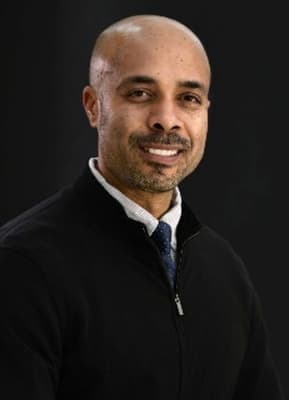Meet Philip Broussard CLS Advisor and Director of International Education at the University of Maryland Eastern Shore (UMES), a Historically Black college and land-grant institution in Princess Anne, Maryland. Philip has experienced first-hand how language leaning opens doors. A desire to understand his family’s name (Broussard) and French ancestry led Philip to major in French and Spanish during his undergraduate studies at Clark Atlanta University.

Philip’s interest in French burgeoned into a desire to understand the world through language—pursuing further study in Arabic, Japanese, Italian, and Korean. Philip’s talent for language has taken him all over the world including serving as a Foreign Service Officer in various locations in South America and East Asia before landing in the education field.
In his role at UMES, Philip inspires students to think about how language learning can be an integral part of their career and academic journeys. In this interview, Philip discusses his path to become a polyglot, and why he hopes more students at Maryland Eastern Shore and other HBCUs consider critical language study.
Rori DiFiore: How has language influenced your career trajectory?
Philip Broussard: Foreign language has been my focus since I’ve been a student. It’s been the focal point of everything I do. I am currently the Director of International Education and head of our Foreign Language Instructional center at the University of Maryland Eastern Shore. Together, these two offices make up the global opportunities available to our students. One of our goals is to encourage students to learn languages and study abroad. If I didn’t speak the languages I speak, I wouldn’t have the career I have. Language has had a profound impact on my life. I ended up joining the foreign service after I graduated and I had an opportunity to travel a bit around and work in embassies and other sectors of government before ending up in academia.
RD: Do you remember what drew you to language learning in the first place?
PB: As an undergraduate student, I wasn’t sure what I wanted to do with my career. I took some general education courses, and I ended up really enjoying my language courses. I double majored in French and Spanish. I was also drawn to French because my last name is Broussard. I understood my great grandfather was French, but my grandfather did not speak French. I wanted to be able to overcome what I thought was an obstacle. I wanted to retrace all of that and understand a piece of my personal history. Once I was in France, I enrolled in French courses with Chinese students, and I was learning Chinese through the French language. I realized I could learn other languages through French. I went on to do that with Spanish, Japanese, and Arabic. It was fascinating learning these languages through a different approach than the Anglo-Saxon common in many U.S. schools.
RD: That’s an excellent point. The French language was a path to not only connecting with people of French ancestry but led you to making connections with people of all different identities and backgrounds from all over the world.
PB: Yes, it was the French language that motivated me to learn Arabic because while in France I came in contact with so many Arabic speakers. I learned about the deep history between France and North Africa. When I left the foreign service and started working for other government organizations, knowing French and Arabic was a huge advantage.
RD: Could you tell us about the University of Maryland Eastern Shore and its institutional history?
PB: We are a Historically Black College and University as well as an 1890 land-grant institution. We have anywhere between 3,000 and 5,000 students on campus every year. We have a lot of niche programs including our aviation program and a strong pharmacy program which attracts many graduate students. We have degrees in 40 disciplines in the arts and sciences and 12 research and degree teaching programs. We opened our doors for the first time in 1886 with only 9 students and one faculty member. There is a lot of history on our campus.
RD: What is your favorite part about being an advisor?
PB: Engaging with students and seeing them get motivated about language learning. I think it is compelling when students can hear about real-life language learning journeys and adventures from their very own advisor. Short of actually being a CLS Scholar myself, I have spent quite a bit of time abroad and most of that time has been focused on learning local languages and cultures.
RD: Why is it important we encourage and help facilitate more HBCU students to have these experiences abroad?
PB: I noticed from my time overseas that there can be distorted views and perceptions of what being an American is and looks like. Opening opportunities for African American students to travel is both good for them and good for the world. It ensures that there is more representation of what being an American really is and looks like. Our students would love to have experiences overseas, but they often feel it is out of reach for them—as a student, as a student of color, and as someone who might be just barely able to afford their tuition. Without scholarship opportunities like CLS, part of our student demographic would often not be able to go abroad. That’s a big reason we put an emphasis on ensuring that students are aware of the prestigious awards that exist for them.
RD: How do you spark interest in critical language study for individuals who may have never considered it before?
PB: Students often don’t consider learning a language to any sort of degree of proficiency beyond one or two years. I’m still trying to figure out why that is. I try to use as much scientific data as I can to support the importance of critical language learning including information from ACTFL (the American Council for the Teaching of Foreign Languages). It is one of the issues our office certainly faces. We are trying to work with STEM disciplines since they tend to be one of the most apprehensive to language study. I use data to show that there is value in learning a language no matter your discipline. Increasing awareness is key. It’s just a fight against the clock. At the end of the day, we only have four years while students are here on campus to impart that interest in language learning. We have made strides at UMES. Last year, we rolled out a foreign language minor for students and we are working closely with incoming freshmen.
RD: It’s been wonderful speaking with you, Philip. To close us out, I was hoping you might share some words of advice to other CLS advisors working to increase interest in critical language learning on their campuses.
PB: Persistence and motivation are key elements to ensuring students follow through on their applications. Periodically checking in and sending students reminders about their application is helpful as well. I would add that getting faculty members involved in the outreach process is something that has led to greater student interest in the CLS Program on campus.
Advisor Chat was created to highlight the perspectives of our advisors and showcase the important work they do to make the CLS Program possible. Are you a CLS advisor who would like to be featured in an upcoming Advisor Chat? Email Communications Officer, Rori DiFiore at clsadvisors@americancouncils.org.


